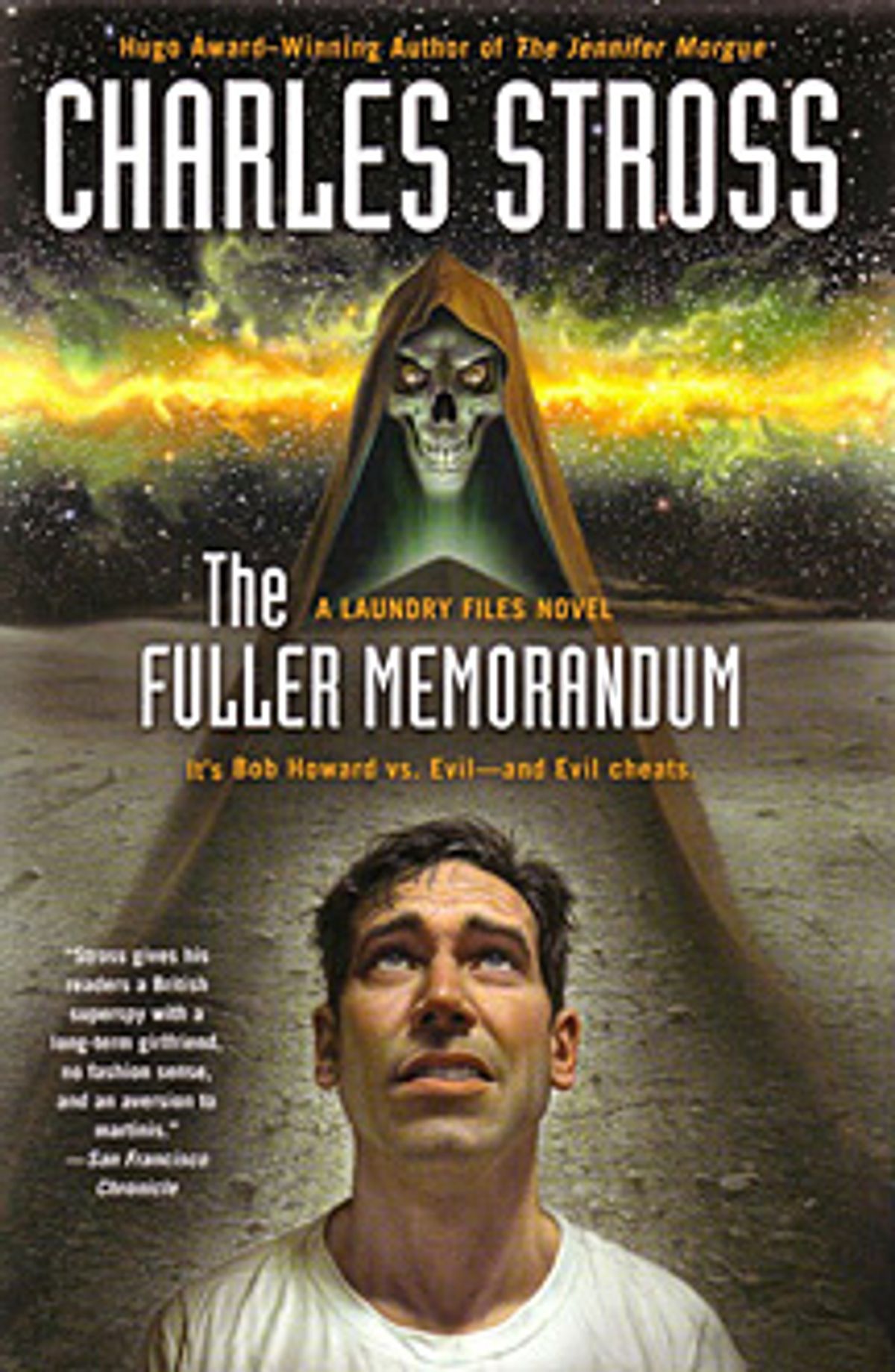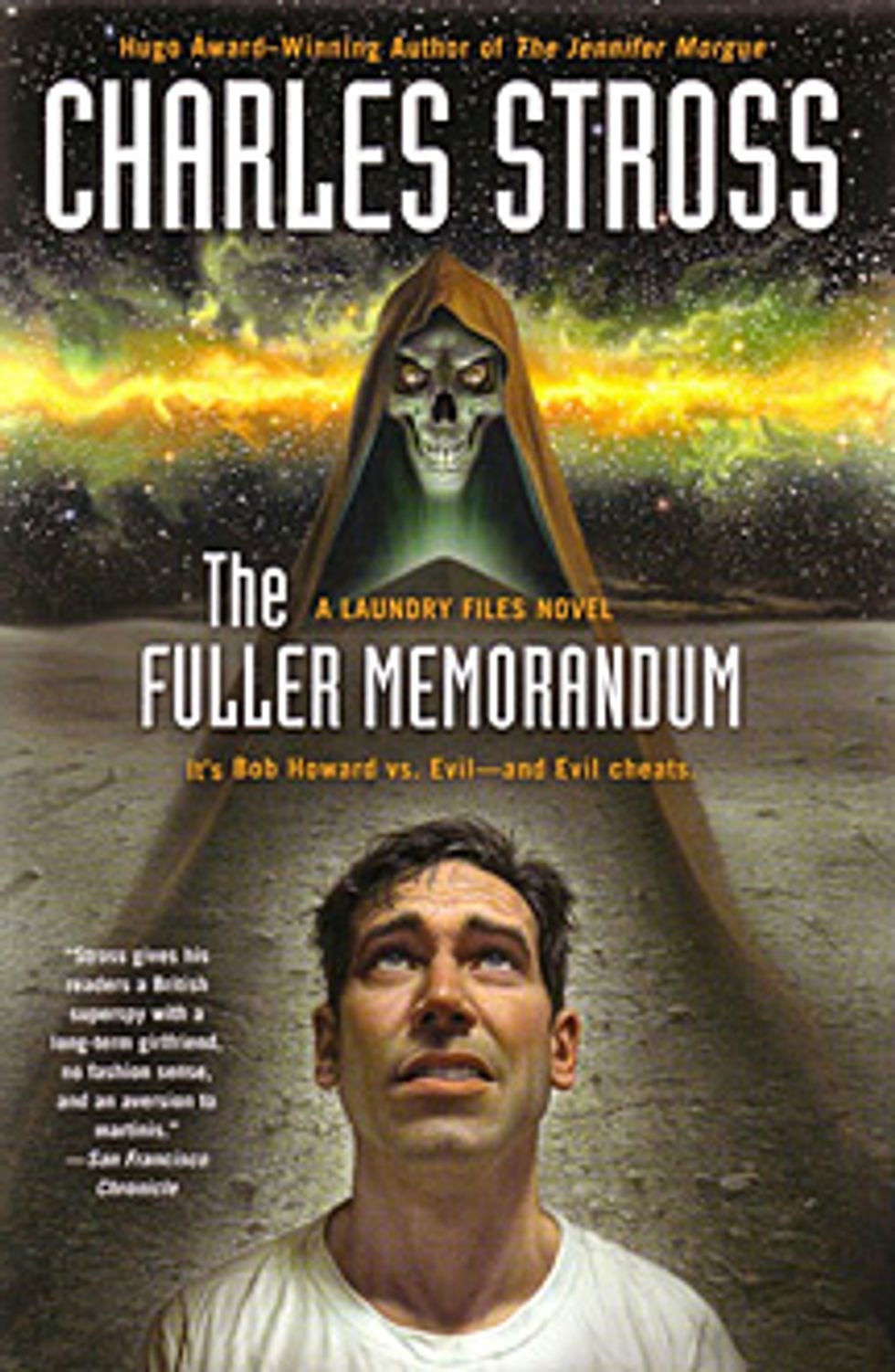Reviewed by Sally Adee
By Charles Stross; Ace Hardcover, 2010; 320 pp.; US $25; ISBN: 978-0-4410-1867-3
The best sci-fi writers are society’s palm readers, inventing along the way much of the nomenclature that we now associate with online existence—for example, "cyberpunk," popularized by William Gibson’s Neuromancer (1984), or "avatar" to refer to one’s virtual body representation, in Neal Stephenson’s Snow Crash (1992).
Then the present caught up with the future, which Gibson acknowledged when he set his 2003 novel Pattern Recognition in a present-day wasteland of corporate brands and mass-market advertising. By 2007, on the occasion of his modernist novel Spook Country, Gibson told The New York Times Magazine, "Contemporary reality is like an overlapping set of dire science-fictional scenarios." In other words, everything he was writing about was already happening.
Indeed, technology now advances so quickly that by the time the trees are chopped down for a sci-fi book to be printed, its futuristic visions are already passé. Witness Google Goggles, which weren’t even a twinkle in the eye of Sergey Brin when British writer Charles Stross released Halting State in 2007. Soon enough, Apple will turn eyeglasses into iGlasses, and the cop on the corner will know everything about you the moment you wander into her field of view.
It’s exactly that rapid evolution of technology that makes life a bitch for a latter-day Nostradamus. Unless you get very meta, which is arguably Charles Stross’s niche in the sci-fi pantheon. The evolution of technology was the central plot line in his confusing and brilliant 2005 novel Accelerando, a fictional account of the coming technological singularity. Though it assumes we don’t die out from climate change, self-irradiation, or withdrawal once Moore’s Law runs out, even in Stross’s best-case scenario, technological evolution reads like a road map to extinction. The human race tires of its fleshy constraints, uploads itself into the cloud, dismantles the planets (in a delightful homage to physicist Freeman Dyson) to make maximum use of the unobtainium-like material that drives the post-silicon singularity, and finally, loses all vestiges of what it could possibly mean to be human. Accelerando is the perfect antidote to singularity guru Ray Kurzweil, even as it accepts all his premises.
So who is this heir to Gibson and Stephenson? Charles Stross is a master of riveting prose, original storytelling, and Möbius-like plot twists, a genre-polymath who can pull off hard sci-fi (Accelerando), crazy space opera (Glasshouse, 2006), and sci-fi whodunit (Halting State).
The Fuller Memorandum is the third and final book in the Laundry Files trilogy, after The Atrocity Archives (2004) and The Jennifer Morgue (2007). Apparently the ease of simply sticking to a single genre became terribly boring; here, Stross tries his hand at a fusion of Ian Fleming, H.P. Lovecraft, the cartoon Dilbert, and the British TV show "The Office". For good measure, he seasons this witches’ brew with a kick of mind- and gender-bending.
In the hands of a merely competent writer, such a dish would curdle even before the marinade was complete. Penned by Stross, it’s a campy, riotous joy that centers on the exploits of Bob Howard, a beleaguered tech-support drone in an obscure British ministry in charge of protecting humanity from ravenous alien intelligences for whom the human soul is an eagerly sought delicacy. The main characters are the kind you think about long after you have reluctantly turned the last page, and Stross has a Dickensian ability to bring the minor ones, however vanishingly small, to life.
Stross is as generous about crediting his influences as he is talented as a mashup artist of their work. Delightful references pop up like Easter eggs: The name of the protagonist’s boss is a deep Lovecraft pun; the reason we approach annihilation—too many observers observing!—is a well-known staple of cocktail party physics. He’s as easy with satire as he is with gothic horror. In the dishwater vocabulary of Howard’s civil service workplace, for example, gruesomely violent apparitions become "reality excursions."
No trilogy is perfect, and in his final installment, Stross unfortunately—and uncharacteristically—wraps it all up quite tidily without ambitiously daring to fail. To be sure, the result is a very good book. But by the third installment, frankly, you want Stross to make your head explode. Which is unfair, because he’s already blown your mind a first and a second time.
Stross falters in minor ways as well—the term "gibbering horrors," for example, is thrillingly evocative the first time you read it and infuriating by the seventh. In general, the third book doesn’t quite crackle as much as the first two did—perhaps Stross was impatient to get on to the next great idea. But such criticisms can’t touch the fact that The Fuller Memorandum is a satisfying conclusion to a great trilogy. It’s rare that an author manages to sustain a tease for hundreds of pages and then convincingly pay off such a debt.
These books will get under your skin. Speaking for myself, I haven’t been this swoony since I cut all the labels off my garments in a humiliating attempt to be like Cayce Pollard, the main character in Gibson’s Pattern Recognition (2003). Buy Stross’s Laundry Files trilogy on a Friday night—better yet, lunchtime—and head home. Stock up on microwavable food and a 12-pack or two. I guarantee a lost weekend.
For more book reviews, see the full list.
About the Author
Sally Adee, a former IEEE Spectrum associate editor, is now at New Scientist, in London. She’s wanted to sing Charles Stross’s praises in print for years.

